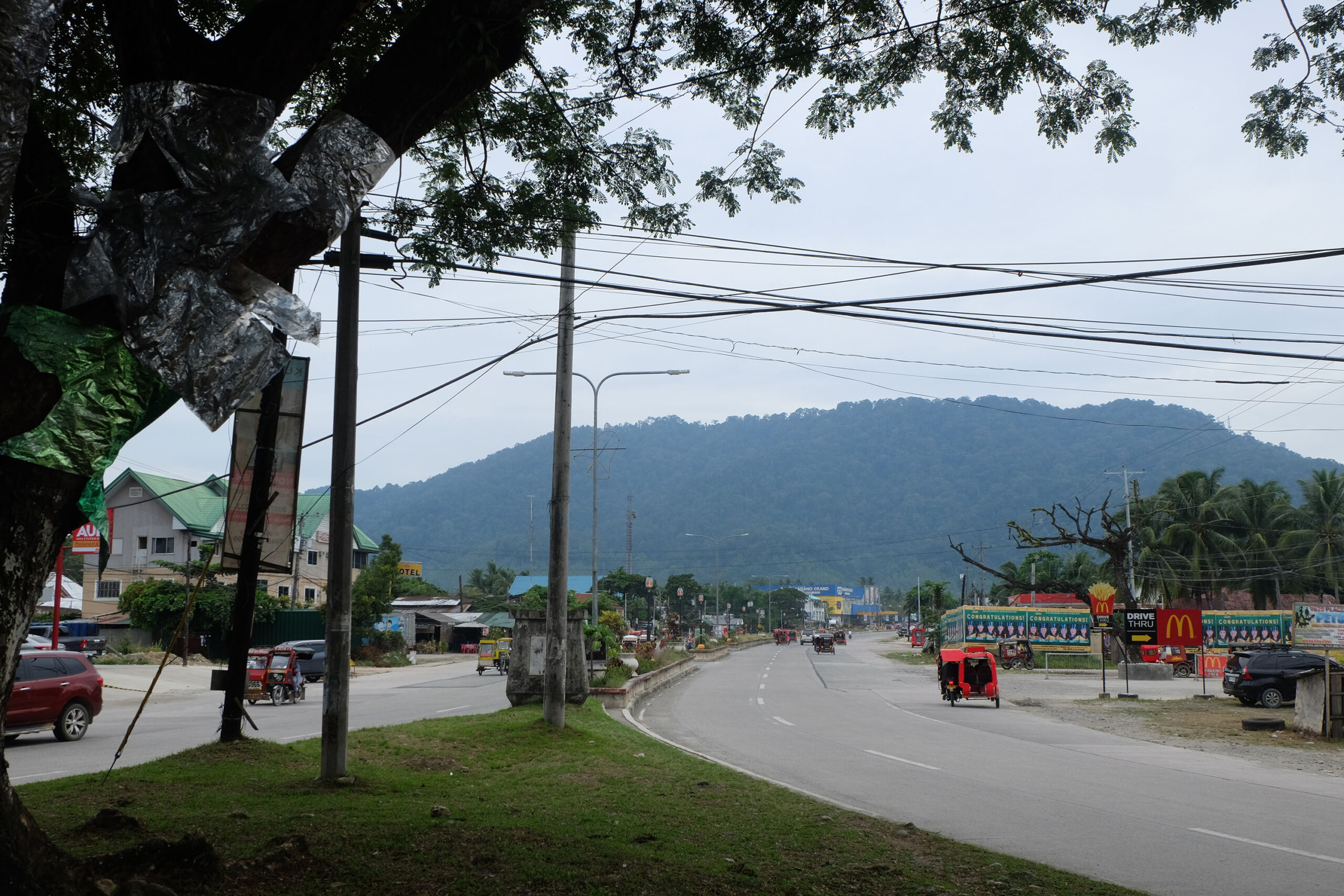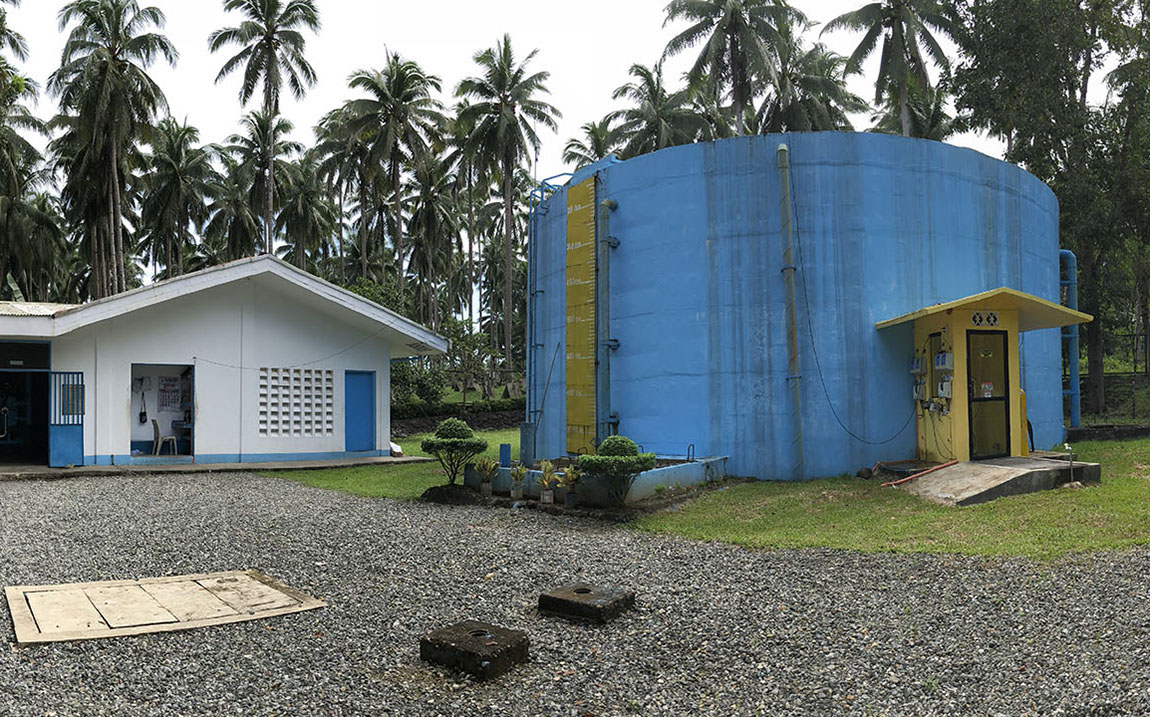 The majestic Mt. Magdiwata teems with lush forests as seen at the rotunda in San Francisco, Agusan del Sur. MindaNews photo by CHRIS V. PANGANIBAN
The majestic Mt. Magdiwata teems with lush forests as seen at the rotunda in San Francisco, Agusan del Sur. MindaNews photo by CHRIS V. PANGANIBAN
SAN FRANCISCO, Agusan del Sur (MindaNews / 20 February) – A mining company seeking to explore the buffer zone of the Mt. Magdiwata Watershed is allegedly helping a Manobo clan secure a Certificate of Ancestral Domain Title (CADT), the top executive of a water utility here said.
Elmer Luzon, general manager of the San Francisco Water District (SFWD), believed that AbaCore Capital Holdings, which is eyeing to explore the watershed’s buffer zone area, maybe assisting the Oyay Mansaloay Antod Ogow Bando Ugong (OMAUBAO) Tribal Clan Organization process their CADT application.
CADT is a title formally recognizing the rights of possession and ownership of indigenous cultural communities/indigenous peoples over their ancestral domains identified and delineated in accordance with Republic Act 8371 or the Indigenous Peoples Rights Acts.
A CADT holder can accept or reject projects that encroach on their ancestral lands.
Last December 1, AbaCore requested the local government unit to post on its bulletin board their application for an exploration permit with the Mines and Geosciences Bureau.
Luzon said the firm is allegedly funding the clan in processing their CADT application with the National Commission on Indigenous Peoples (NCIP).
MindaNews tried but failed to get the side of AbaCore as of posting.
However, tribal chieftain Bardo Bando, the indigenous peoples’ mandatory representative to the Sangguniang Bayan (SB), denied Luzon’s allegation in an interview at the sidelines of the SB session on Monday.
Bando, however, refused to elaborate when pressed to explain his denial.
But he stressed that the SFWD board of directors and management “are exhausting all administrative remedies to stop both the mining exploration and the clan’s CADT application.”
Since 2019, SFWD had sent copies of board resolutions asking the NCIP to exclude the 1,658-hectare Mt. Magdiwata Watershed and Forest Reserve from any CADT application.
Mt. Magdiwata was declared a watershed and forest reserve through Presidential Proclamation No. 282 dated October 25, 1993.
The watershed is the only source of potable water for the 20 villages of this town. A municipal ordinance allocates a one-kilometer buffer zone, where earth-shaking activities such as mining are prohibited.
 One of the main water reservoirs of the San Francisco Water District (SFWD), which gets its source from springs inside the presidentially proclaimed Mt. Magdiwata Watershed. SFWD is the envy of water districts in the Caraga region because it can supply regularly some 8,200 consumers year-round. SFWD contributed photo
One of the main water reservoirs of the San Francisco Water District (SFWD), which gets its source from springs inside the presidentially proclaimed Mt. Magdiwata Watershed. SFWD is the envy of water districts in the Caraga region because it can supply regularly some 8,200 consumers year-round. SFWD contributed photo
The NCIP has yet to act on the repeated requests from the SFWD board, the latest of which was made on January 23.
Last December 14, or 13 days after AbaCore requested the posting of their exploration permit application at the municipal bulletin board, Bando communicated with Mayor Grace Carmel Paredes-Bravo about a certificate of recognition issued by the NCIP on Omaubao’s CADT No. R13-SFR-1222-260.
The CADT application covers at least 7,000 hectares straddling eight villages in San Francisco town and portions of four villages in neighboring Barobo town in Surigao del Sur. The Mt. Magdiwata Watershed and its one-kilometer buffer zone are also covered by the CADT application.
Citing a portion of the NCIP certificate of recognition, Bando said that based on Section 52 of the Indigenous Peoples Rights Act (IPRA), the recognition “effectively terminates any legal basis for the jurisdiction that may be previously claimed over the ancestral domain.”
Luzon said the board would file an administrative complaint against the NCIP commissioners for using the words “terminate all previous jurisdictions,” which he added is an “abuse of discretion.”
An SFWD resolution cited section 56 of IPRA, which recognizes property rights within ancestral domains that are already existing before the passage of the law.
The SFWD has been at the forefront of protecting and rehabilitating the watershed over the last three decades. Its forest cover has since increased from 41 percent to 95 percent.
According to SFWD studies, at least 680 ha of natural forest or 41 percent was left within the Mt. Magdiwata watershed in December 1997.
The forest was denuded with about 900 hectares (ha) stripped by large-scale logging in the 1960s to 1970s and the unabated tree-cutting activities in the 1980s to supply sawmills that proliferated in the town. (Chris V. Panganiban / MindaNews)
